If one NFL game had gone differently the day before, Marquise Culp would’ve made thousands of dollars on a parlay, he said, as he displayed a few fresh betting slips. He and his friends gathered at the new sportsbook at Bingo World in Brooklyn Park, talking about wagers they had on football, basketball and hockey games, bragging about big wins and lamenting such near-misses.
Despite losing that parlay, Culp was a winner that weekend, and he was back Monday with about $1,000 tied up in the evening’s games.
“It’s the thrill of betting,” he said. “Being at the edge of your seat because you know you got money on the game. That’s the only way I can watch the game, if I got money on it.”
Culp watched games in an area that was once Bingo World’s nonsmoking section, and later its special event space, and is now the establishment’s sportsbook. But soon, virtual sportsbooks will be available on Marylanders’ cellphones.
Maryland voters legalized sports betting in a 2020 referendum, following changes in 2018 to federal law. Physical sportsbooks have been in the state since 2021, but the mobile option has taken longer, frustrating bettors. Online wagering will finally begin Wednesday, as seven companies are both ready to launch and have approval from Maryland officials: Barstool Sportsbook, BetMGM, BetRivers, Caesars, DraftKings, FanDuel and PointsBet.
What was once legally available only in Nevada has grown popular, and over the past four years, most states hurried to allow sports gambling. Sports Illustrated, once just a magazine, and Hard Rock, once just a cafe, each have online sportsbooks.
Marylanders, like Culp, have been eager to legally bet and companies have been eager to woo them. Billboards in the state flash ads for BetMGM and then DraftKings, one after the other. DraftKings has enlisted former Ravens and Terps to promote their product with social media videos, and multiple online books are offering $200 worth of credit as a sign-up bonus.
With sports betting getting underway, a mix of negative and positive outcomes are expected. Gambling is addictive for some people and can be harmful, but there’s enthusiasm from gamblers and thrill-seekers who have long awaited a chance to legally bet from the comfort of their homes.
At Bingo World, a neon sign outside advertises that the BetRivers company that operates the sportsbook inside offers wagers on 30 different sports. The book has 26 televisions, 33 armchairs with built-in phone chargers, 24 high-top chairs, 12 betting kiosks and an ATM. For gamblers, like Culp, who visit sportsbooks most days, the legalization is more than welcome.
“It’s just adult fun,” he said, “without getting yourself in trouble.”
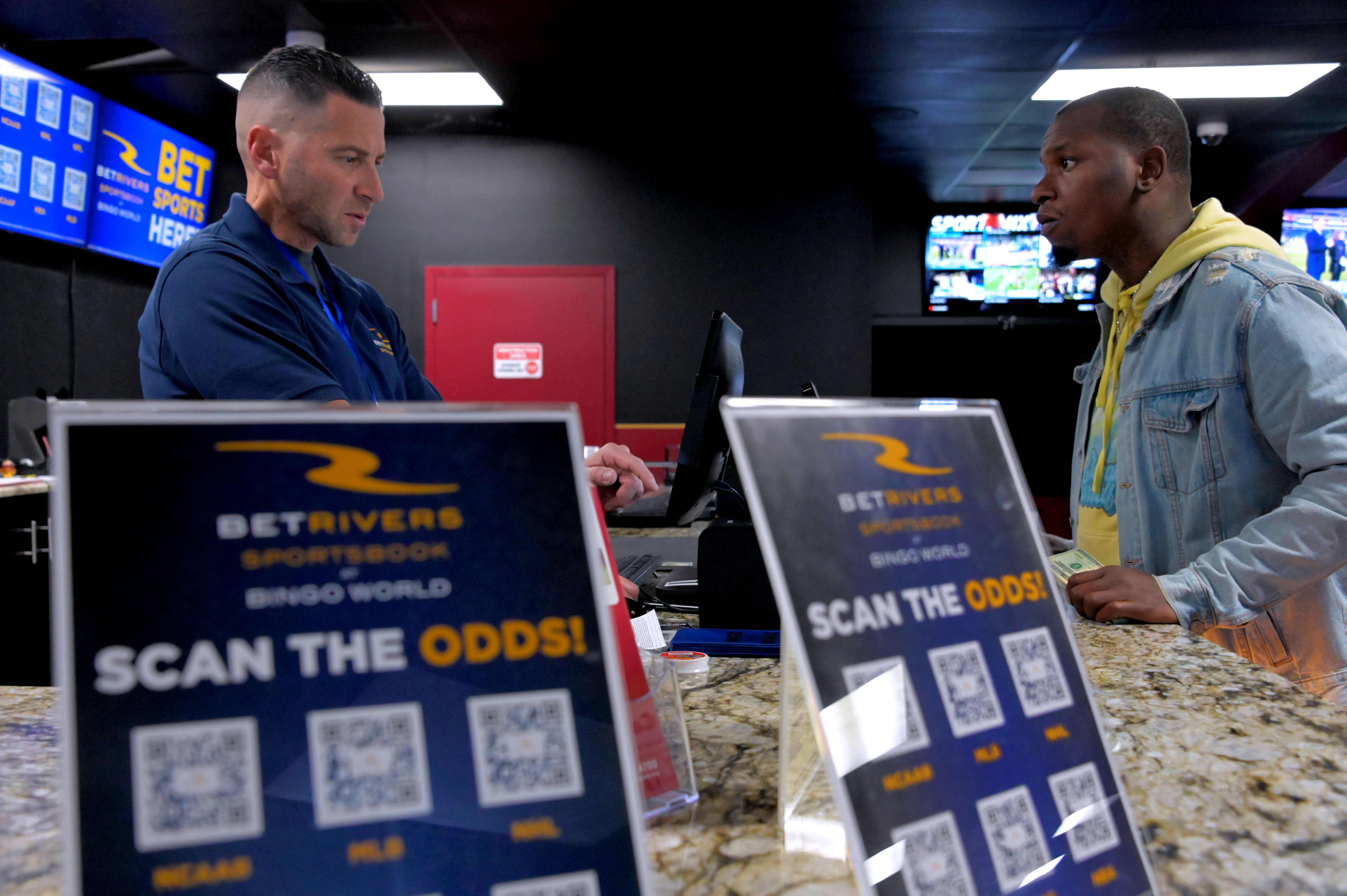
Eager impatience
The top question Rob Norton, the president of Cordish Gaming Group, said he’s received over the last year from friends is: “When will I be able to bet on my phone?”
Public comments reviewed at last month’s Sports Wagering Application Review Commission (SWARC is a state committee created to issue licenses) displayed the excited impatience felt by gamblers. “What in God’s name is taking so long?” one commenter asked.
In-person sports betting has been allowed around the state since December at locations such as Bingo World, Horseshoe Casino in Baltimore and Live! Casino & Hotel in Hanover. But it wasn’t until Nov. 16 that Maryland’s gambling commission finally approved the first round of mobile licenses, paving the way for online wagering by Thanksgiving.
Part of the commission’s focus, as mandated by state law, is to promote racial, ethnic and gender diversity. The application process was comprehensive; for example, “to broaden participation in the industry,” businesses had to demonstrate that at least 5% of their license would be owned by individuals with a net worth below $1.8 million.
“The language of the law which created SWARC has been challenging, and our commission has taken seriously its intent to enable diverse participation in this new industry,” chair Tom Brandt said during the Nov. 16 meeting.
The advent of mobile betting opens up more varieties of gambling. For example, it’s difficult to make in-person “live bets” — that is, wagering on a game as it’s happening — since a game’s circumstances might change while a bettor stands in line. On mobile, everything is instant.
“It opens up the door for a lot of our technology to allow for in-game betting, which is a lot harder to do in a physical location,” Norton said.
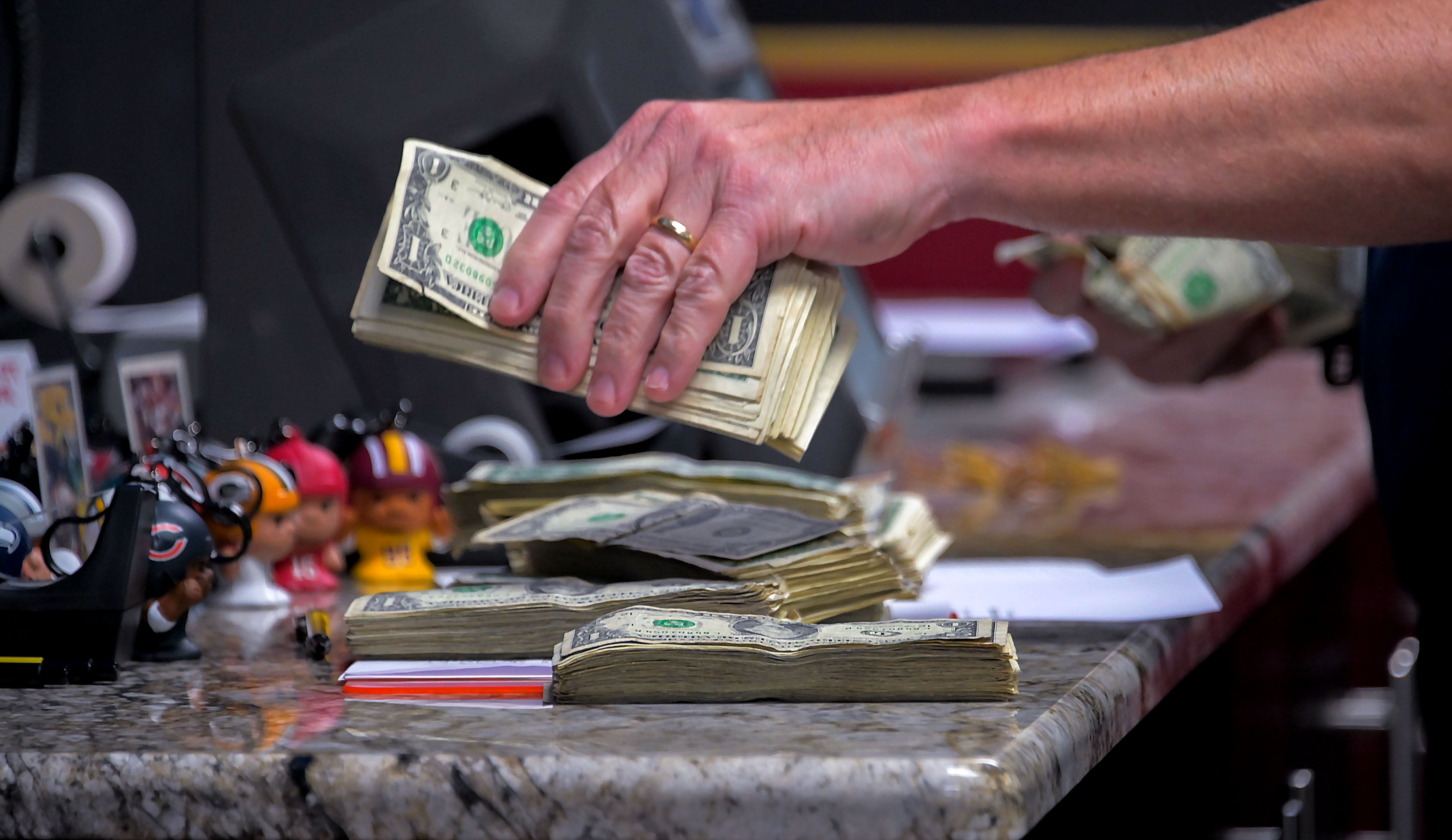
But the biggest change is convenience. Once mobile betting starts, rather than placing bets at one of Maryland’s eight physical sportsbooks, people can wager wherever they have internet service. That’s expected to substantially increase the number of dollars wagered.
Some gamblers said they’ll still come to the sportsbooks — for the social aspect or for the access to TVs. Others said they’ll wager from their couch. “I’ll be home,” said sports bettor James Miller.
It’s taken Maryland longer than any other state to offer online sports gambling, from election to implementation. Some states, like Virginia, took under a year.
“They should’ve done it a long time ago,” said Nick Clemens, a manager at Bingo World. “The public outcry and demand for it has been immense.”
‘The house is gonna win’
Will Hinman was introduced to his first bookie before a New York Giants game in the early 1990s when he was 19. He placed a couple of wagers, maybe $25 each, on the game’s outcome.
“Of course, I won both sides,” said Hinman, now a peer recovery specialist with the Maryland Center of Excellence on Problem Gambling. “That just started a long, 24-year relationship with sports gambling.”
Hinman became increasingly interested in betting, particularly on the NFL. He liked to have action on everything; his bookie once asked him if he realized he’d called in 88 plays that day. And although he wagered often, it wasn’t the financial aspect that was the most damaging.
“Don’t get me wrong, if I add up all my losses over the years, it’s disgusting. It makes me want to vomit,” he said. “But it was the time and the preoccupation. It consumed so much of my time and attention.”
He’d spend his time placing bets and thinking about his wagers and how much he might have to bet later to make up for any losses. Even when spending time with loved ones, he’d check scores.
In addition to a gambling addiction, he battled alcoholism.
He gambled his nest egg away, went through two divorces and eventually became suicidal.
“It just really reduced my self-worth to nothing,” he said.
A family member intervened and Hinman went to rehab. He’s been sober since 2014 and hasn’t placed a sports bet since 2013.
Now, he helps others seeking to limit, control or stop problematic gambling behavior. Gamblers seeking help can call or text 1-800-GAMBLER and receive treatment for no cost.
The Maryland Center of Excellence on Problem Gambling, which is affiliated with the University of Maryland School of Medicine, does not take a position for or against legalized gambling, but is preparing for more people seeking help.
“When you legalize and increase access to something that can be potentially harmful to some, it may lead to addiction,” Hinman said. “I would expect we would probably see an increase in calls. So we’re preparing for it.”
The Illinois Council on Problem Gambling said there has been an “uptick” in calls for help since sports betting was legalized there in 2020, and the Connecticut Council on Problem gambling has reported about a 125% average increase in monthly call volume since sports wagering began there in 2021.
Before Maryland legalized sports gambling, individuals had to drive to a state where it was legal to bet or illegally wager online using offshore accounts. The inconvenience limited sports betting’s popularity.
Mary Drexler, the Maryland Center of Excellence on Problem Gambling program director, said not only could the accessibility of betting from your home affect those currently battling addiction, it could also lead to negative effects for those who had never gambled, but start because of the easy access.
For the vast majority, sports gambling is simple fun and excitement. But it can also lead to “adverse consequences,” Drexler said, like anxiety, depression, financial difficulties and strained relationships.
Deborah Haskins, the president of the Maryland Council on Problem Gambling, said there is a “psychological experience” attached to sports betting. She noted that many sports gamblers enjoy using logic to try and profit.
Of course, winning is hard to pull off. From July to October, the “hold” at Maryland’s in-person sportsbooks — that is, the percentage of money that the book retains for each dollar spent by a bettor — was 16.4%.
“The bottom line is the house is gonna win more than you are,” Haskins said. “The house is always gonna win more.”
Betting on education
When Marylanders voted on the issue, they were asked if they favored the authorization of sports gambling “for the primary purpose of raising revenue for education,” and funding education has ostensibly been at the center of the push to develop the market.
And sports wagering has raised some money for education: 15% of sportsbook profits go to the Blueprint for Maryland’s Future Fund. To date, sports wagering has generated about $5.4 million for education.
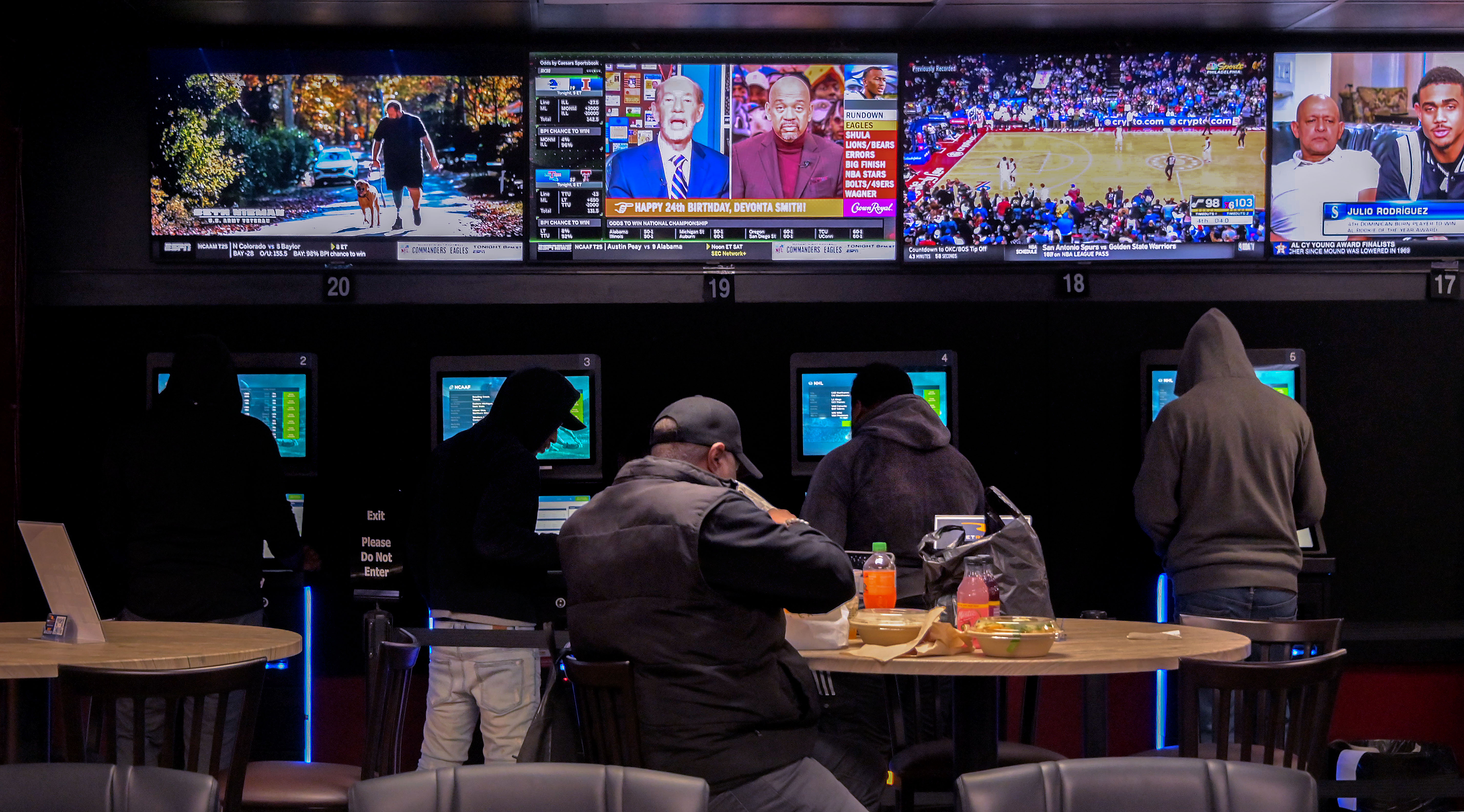
That’s roughly the same amount ($5.5 million) as companies such as BetMGM, DraftKings, FanDuel and the Washington Commanders spent to encourage voters to legalize it in 2020, according to OpenSecrets, a nonpartisan campaign finance tracking organization.
The industry’s contributions to education will, of course, rise as the popularity of sports betting increases. Eilers & Krejcik Gaming, a research firm, predicts that Maryland will receive $26.4 million from sports betting in 2023 and by 2027 could bring in $99.7 million. By comparison, the lottery contributed $673.7 million to the state during the most recent fiscal year.
Historian Jon Cohen’s recent book, “For a Dollar and a Dream: State Lotteries in Modern America,” notes that state lotteries are not as profitable as some claim. Lotteries became popular in the 1970s and ’80s — both because of public demand and to generate public revenue — and Cohen sees parallels between lotteries then and sports wagering now. He said lotteries “softened the soil” for other types of gambling, like sports betting, and provide a “cautionary tale.”
While “every dollar helps,” Cohen said, the prediction of Maryland generating about $25 million in sports betting revenue for the state next year is “just a minuscule amount of money compared to the bread-and-butter tax revenue.” Maryland’s annual budget is in the tens of billions of dollars.
“A lot of these glittery gold projections of all the good that sports gambling is going to do are more illusion than reality,” he said.
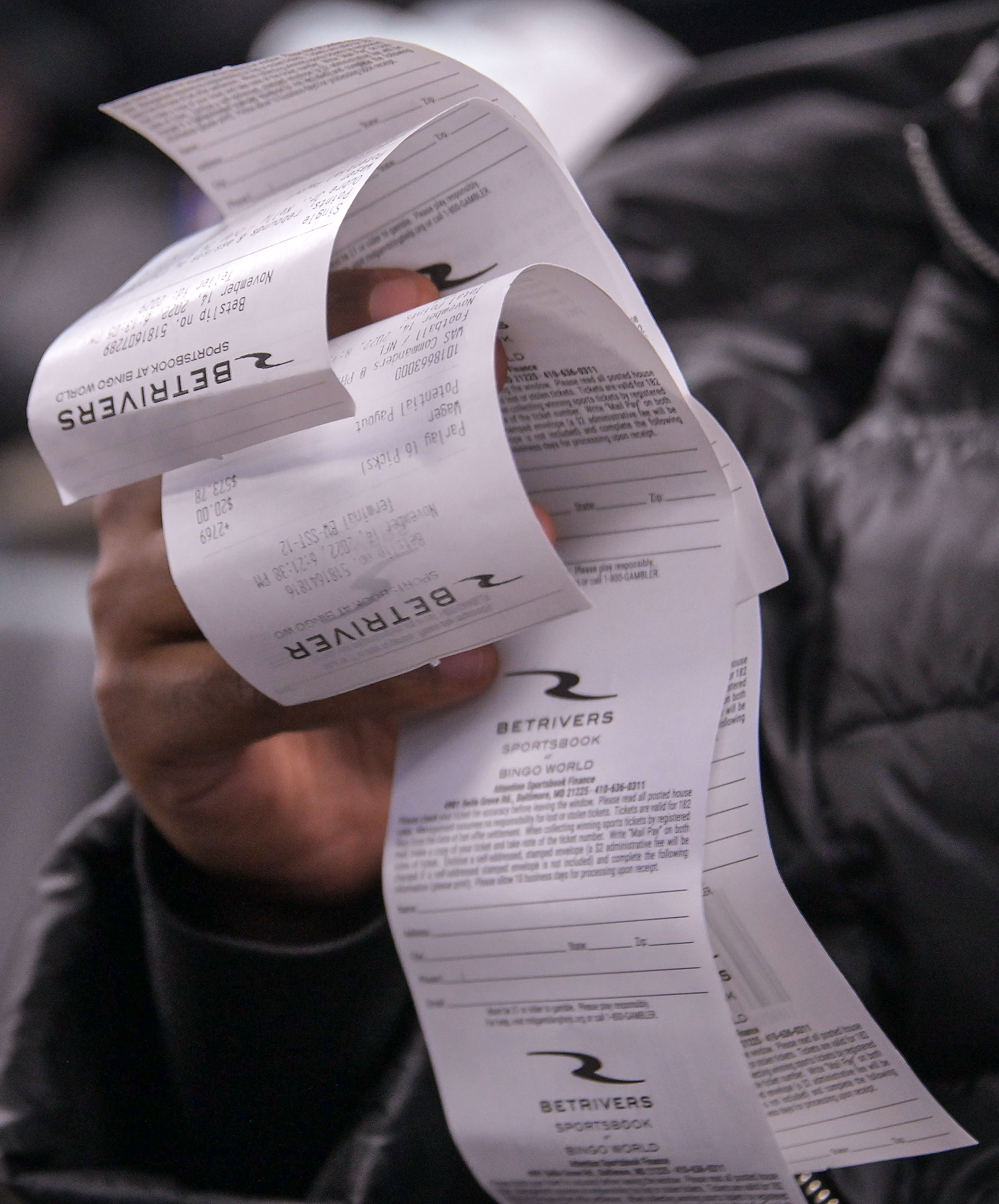
Taking that risk
Regardless of its contribution to the state, sports gamblers have been clamoring for months for the legalization of online wagering and soon — at long last — they’ll be able to do what nearly 70% of voters approved in 2020.
“The customers want it,” Norton, the Cordish Gaming Group president, said.
Sixty-six percent of Americans now approve of betting on pro sports, according to a Washington Post-University of Maryland poll. That’s up from 55% in 2017 and 41% in 1993.
Enticed by the thrill of a victory and the captivating nature of selecting winning picks, gamblers are enthused by the prospect of a mobile option.
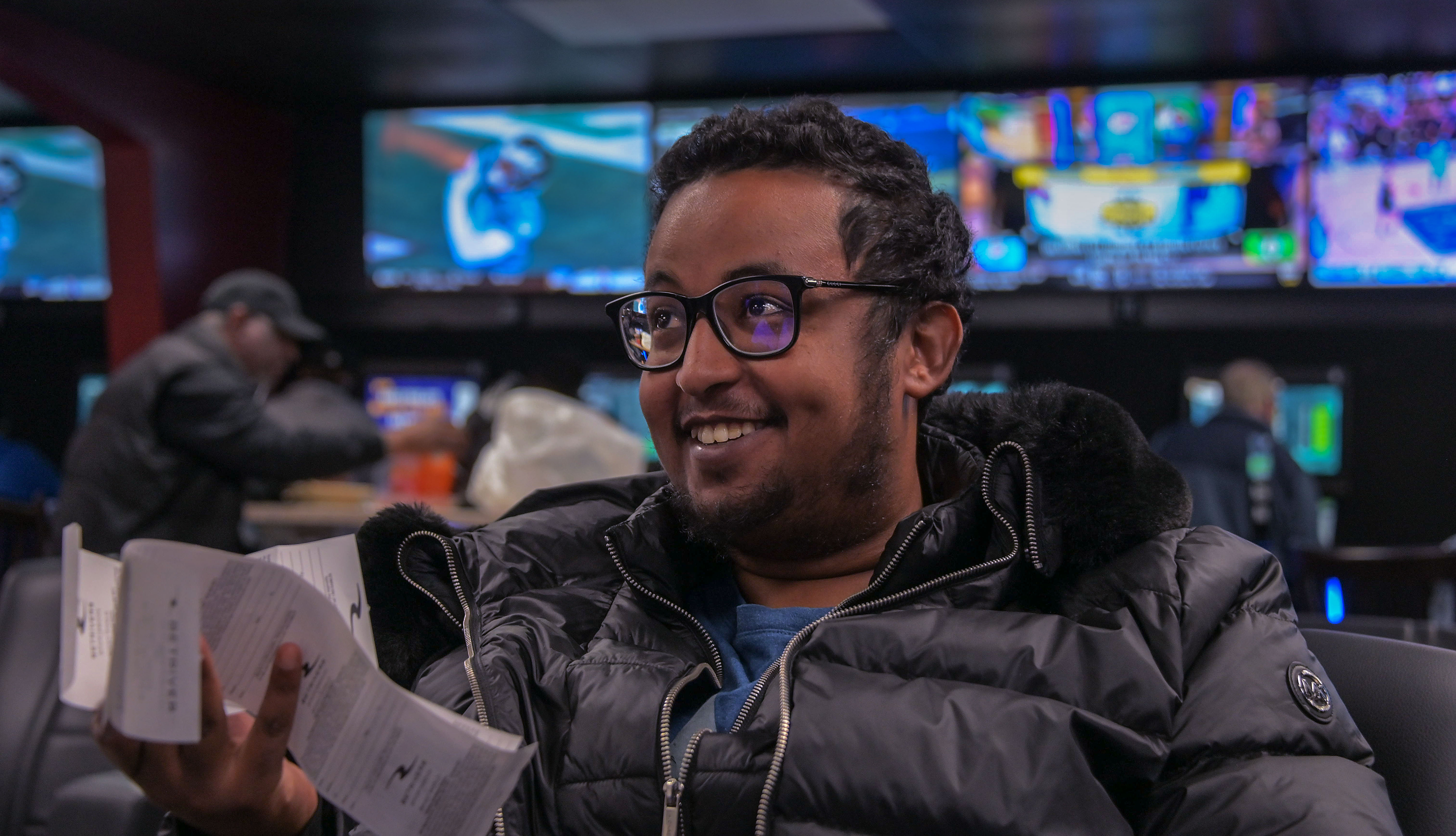
On Monday night at Bingo World, Leul Gebreyohannes watched an NBA game, rooting on P.J. Washington, Mason Plumlee and Kelly Oubre of the Charlotte Hornets to each achieve statistical benchmarks. Oubre didn’t, but Plumlee and Washington did. And Gebreyohannes was a winner.
Gebreyohannes doesn’t consider himself a gambler. Instead, he’s a sports fan who likes reasoning through outcomes and making sound decisions.
“This just spices it up,” he said.
Culp, however, said he’s not as much of a sports fan as he is a gambling fan. As he monitored a few of his parlays — he likes combining a few of the favorites on the same ticket — he said he isn’t concerned about losing a substantial amount of money. Eventually, he’ll win, he said.
“I love taking that risk,” he said. “There’s always something that you can get your money back on.”









